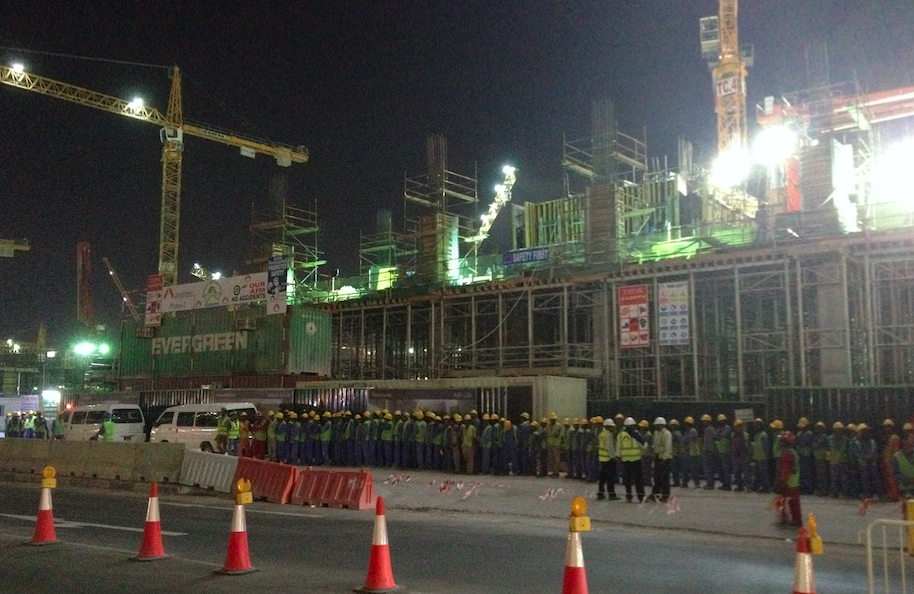
The Doha Skyline at night. Photo taken by Sam Bollier.
The Gulf state of Qatar has repeatedly promised to reform its much-criticized labor system. Yet two years after its government announced plans to make major changes, the raft of proposed reforms still has not been implemented.
What explains the delays?
It certainly cannot be chalked up to lack of international pressure. This March, the UN’s International Labor Organization threatened a formal inquiry into Qatar’s alleged use of forced labor unless sweeping labor reforms are made within a year – and similar criticism has been leveled against Qatar since 2010, when it won its bid to host the 2022 World Cup.
Migrant workers, brought in to help build Qatar’s burgeoning infrastructure, make up an estimated 85% of Qatar’s population. Many of the predominantly South Asian migrant workers earn higher salaries than they would in their countries of origin – but many also suffer from maltreatment, or are paid less than they were promised.
Under Qatar’s labor system, known as kefala, migrant workers are “sponsored” by their employer, and law forbids them from changing jobs or leaving the country without permission. This power dynamic can easily lead to abusive situations and poor working conditions, and news reports abound with stories of migrant workers unable to leave Qatar because their employer refuses, or is otherwise unable to, grant them exit visas. Even after their contracts expire, workers cannot immediately take up another job in the country unless their previous employer agrees to let them do so.
In the past, certain Gulf states – all of which use some form of the kefala system – have announced major changes to their labor policy, but subsequently back-tracked. Kuwait stated in 2010 that its kefala system would be abolished – but in 2011, officials said they were not ready to make the change. In 2012, a Saudi Labor Ministry official said reforms were on the way, stating that Saudi Arabia does “not recognize anything known as sponsorship.” Yet today, kefala in Saudi Arabia remains alive and well. Bahrain loosened its sponsorship system in 2009, allowing migrant workers to change jobs without their employers’ permission, but the reforms were rescinded following unrest in the kingdom in 2011.
The United Arab Emirates has taken a somewhat different trajectory. In 2011, migrant workers were granted the right to change employers upon completing fixed-term contracts. This reform, which remains in effect today, may have led to an increase in workers’ earnings, one study has found.

A construction site in Qatar. Photo taken by Sam Bollier.
In 2014, the Qatari government announced it was abolishing its kefala system, though the specific reforms proposed – making it easier for migrant workers to change jobs and leave the country, and stricter penalties for employers who violate workers’ rights – did not live up to this billing. Nor was a timeframe announced for implementation. The following May, Qatar’s minister of labor and social affairs said he was “90 percent” certain that these reforms would be implemented by the end of 2015. But the very next month, Qatar’s Shura Council, the country’s legislative body, commented that there was “no need to hurry” with the reforms, and introduced a set of proposals that would circumscribe migrant workers’ rights even further.
The changes to Qatar’s labor law are currently expected to take effect in December 2016, two and a half years after they were first announced. In the meantime, Qatari officials have repeatedly counseled patience. “We’ve always recognised that we don’t have a magic wand that could fix the matter from the very beginning,” said Hassan Al Thawadi, the Secretary General of the Qatar 2022 Supreme Committee, earlier this year. “We’re resolving gaps day by day.”
A common response to these delays is to blame the Qatari government, an absolute monarchy, for its apparent unwillingness to make changes. For instance, in April, Sharan Burrow, the general secretary of the International Trade Union Confederation, declared: “Nobody can deny there is no commitment from the Qatari government to treat workers here as human beings with fundamental human rights.”
While the opacity of Qatar’s political system makes it difficult to discern what is taking place behind closed doors, the situation is likely more complex than Burrow describes. Pro-reform factions within the government may exist, but be outnumbered by proponents of the status quo, or slowed by bureaucratic roadblocks. In 2014, the Qatari government commissioned London-based law firm DLA Piper to write a report advising how to reform its labor system. The report, completed in 2014, recommended that the kefala system should be ended, and exit visas abolished. “Everyone expected, including DLA Piper, that report to be accepted and implemented,” said Nicholas McGeehan, Human Rights Watch’s Gulf researcher. “And it wasn’t. We don’t know exactly what happened … All the evidence would suggest there being reformers in government, who want to move things forward, but in the end clearly they lost the argument.”
Although Qatar is ruled autocratically, the emir is not the sole source of power; two successful palace coups, in 1972 and 1995, attest to that. “All states, including authoritarian ones, are constrained in the range of their options through pressures exerted on them by internal stakeholders as well as by external actors,” Mehran Kamrava, director of the Center for International and Regional Studies at Georgetown University-Qatar, told JMEPP. Kamrava argues that the international push to abolish Qatar’s kefala system “has been off the mark and misses the point,” adding that “the Qatari business community, which is the biggest proponent of the kefala system, has been absent from any of the discussion,” and that human rights lobbying groups have failed to “engage in any way local stakeholders, especially business groups.”
The Gulf region’s private sectors are believed to be a major factor in obstructing labor reforms. “Lobby groups, which have formed to protect important business interests, have at times been so powerful as to successfully sideline those with a more reformist agenda,” wrote Azfar Khan and Helene Harroff-Tavel, of the ILO Regional Office for the Arab States, in 2011. “Indeed, a change in executives is not uncommon when a high ranking official expresses interest in reforming the kefala.”
Qatar’s business community publicly expressed support for reforms when they were first announced in 2014. But it had some reservations – for instance, Qatar’s Chamber of Commerce demanded that certain high-skilled migrant workers be barred from changing jobs for a five-to-ten-year period upon entry. Negotiations with the government over such points appear to have dragged on, delaying implementation.
Yet hesitance towards reform comes from ordinary citizens, too, who worry that increased protection for migrant workers will occur at their expense, absent strong safeguards. The average Qatari household employs two migrant domestic workers apiece, and the kefala system governs the business relationship between them. After paying thousands of dollars to recruiters to hire a domestic worker, many Qataris want bulwarks in place to prevent their maids, drivers, or cooks from suddenly leaving the country, or deciding to work elsewhere at a better-paying job. A 2012 survey found that almost six in ten Qataris prefer keeping the kefala system as it is – and an additional 30% want it to be made even stricter.
“This is a system they’re all very hesitant to tinker with, because it’s a way to control a large amount of the population,” said McGeehan. “Given the demographics, you can understand why there are concerns. And kefala is the easiest way to handle it – just hand all power to the employer … [Qataris] are now being told that they don’t need these laws, which they believe they need to control the workers and make their businesses profitable.”
Migrants are believed to outnumber Qataris by a roughly six-to-one ratio (the government publishes population data, but does not divulge the balance between citizens and migrants), and the overwhelming majority of the migrant workers are male. Some in Qatar see this demographic imbalance as a menacing phenomenon: for instance, a news article published last year recounted how the residents of one neighborhood “requested the relevant authorities intervene to move all the single male residents [i.e., migrant workers] to other neighborhoods designed especially for them, pointing out that the prevalence of single men in the neighborhood has become a real crisis … [residents] have become trapped in their homes, unable to leave, because of the single men strolling around the neighborhood near their homes, around the clock.”
Op-eds published in local media often express skepticism that labor reforms will benefit Qatari citizens. In an article entitled “Understand Us!”, writer Hassan Al-Sai argued that while the proposed reforms are a positive step, “we still don’t know what our duties and rights are under this new system, if it is officially approved … [Will it] solve for us the never-ending problems that take place on a daily basis between the sponsor and the employee regarding their running away, the costs, and their mistreatment of our people? … Will this new law protect me today, as a sponsor? … Who will ensure justice if an employee steals jewelry or money from me and then heads to the airport, never to return?”
Salman al-Slaiti, a columnist who writes for Qatari newspaper Al-Raya, told JMEPP that if kefala were abolished, measures must be taken to protect the “safety and security” of Qatar, such as having migrant workers pay into an insurance account in case they depart the country without notifying their employer, promising to respect Qatari custom and tradition, and ensuring that unemployed migrant workers are quickly found jobs, so that they do not join the underground economy.
If all goes according to schedule, starting this December migrant workers in Qatar may be more easily able to obtain exit permits, and will no longer need approval from their employers to accept another job after their contract expires (they will, however, still need to obtain permission from the Ministries of Labor and Interior).
McGeehan believes there is “no reason to think [the changes] won’t go into effect” at the end of the year, as planned. But he is skeptical of how much impact the reforms will have: “In terms of the effect of the changes, I think it will just be business as usual.”
